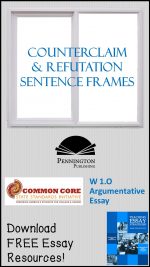Counterclaim and Refutation Sentence Frames
I teach a seventh grade ELA class and we’ve just finished reading Walk Two Moons by Sharon Creech. In fact, we’ve already written our argumentative essays on “whether Phoebe was a good friend to Sal.” Of course the writing prompt is a bit more complex. It’s my students first attempt at writing the argumentative essay. They are struggling with the counterclaim (counterargument) and refutation (rebuttal) as these are new Standards for seventh graders. The Common Core State Standards for grades 7-12 include the counterclaim in the argumentative essay (W. 1.0).
Although writers use plenty of other options, I’m teaching the counterclaim and refutation in the final body paragraph.
The following sentence frames helped out my students considerably:
First Contrasting Transition + Name the Opposition + Strong Verb + Opposing Point of View + Evidence + Analysis + Second Contrasting Transition + Reference the Opposing Point of View + Turn
First Contrasting Transition +
However, But, Admittedly, Although, Alternatively
Name the Opposition +
others, some
Strong Verbs + Denial/Assertion or Assertion
Denial: reject, oppose, disagree, question, doubt this view and Assertion: argue that, reason that, claim that, support, conclude that
Opposing Point of View +
State the opposing point of view.
Evidence +
Pick the best evidence to support the opposing point of view. Don’t pick a “straw man.” In other words, don’t pick a weak opposing argument that is too easy to refute.
Analysis +
Explanation, insight, example, logic to support the counterclaim evidence
Second Contrasting Transition +
Still, However, But, Nevertheless, Yet, Despite, Although, Even though
Reference the Opposing Point of View +
this argument, this position, this reasoning, this evidence, this view
Turn
Now you turn the opposing point of view, evidence, and analysis back to support your thesis statement. Various options can be effective:
1. Accept the criticism of the counterclaim. Tell why all or part of the opposing point of view may be reasonable, plausible, or valid, but minimize the opposing position. For example, This evidence may be true; however, the objection does not change the fact that…
2. Reject the counterclaim. For example, This view ignores the conclusive evidence that… This position is mistaken because…
3. Criticize the evidence and analysis of the counterclaim as being unimportant, irrelevant, or a misinterpretation. For example, this argument misses the key point that…
4. Criticize the reasoning of the counterclaim as being flawed, illogical, or biased.
Some of the above points adapted from the Harvard Writing Center. In addition to using Counterclaim and Refutation Sentence Frames, writing teachers may also be interested in these related articles: Why Use an Essay Counterclaim?, Where to Put the Essay Counterclaim, and What is the Essay Counterclaim?
*****

TEACHING ESSAYS BUNDLE
The author’s TEACHING ESSAYS BUNDLE includes the three printable and digital resources students need to master the CCSS W.1 argumentative and W.2 informational/explanatory essays. Each no-prep resource allows students to work at their own paces via mastery learning. How to Teach Essays includes 42 skill-based essay strategy worksheets (fillable PDFs and 62 Google slides), beginning with simple 3-word paragraphs and proceeding step-by-step to complex multi-paragraph essays. One skill builds upon another. The Essay Skills Worksheets include 97 worksheets (printables and 97 Google slides) to help teachers differentiate writing instruction with both remedial and advanced writing skills. The Eight Writing Process Essays (printables and 170 Google slides) each feature an on-demand diagnostic essay assessment, writing prompt with connected reading, brainstorming, graphic organizer, response, revision, and editing activities. Plus, each essay includes a detailed analytical (not holistic) rubric for assessment-based learning.
